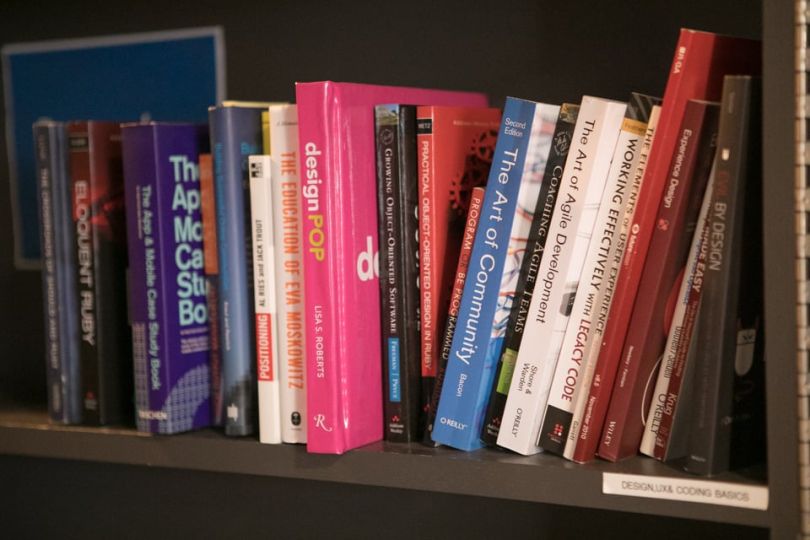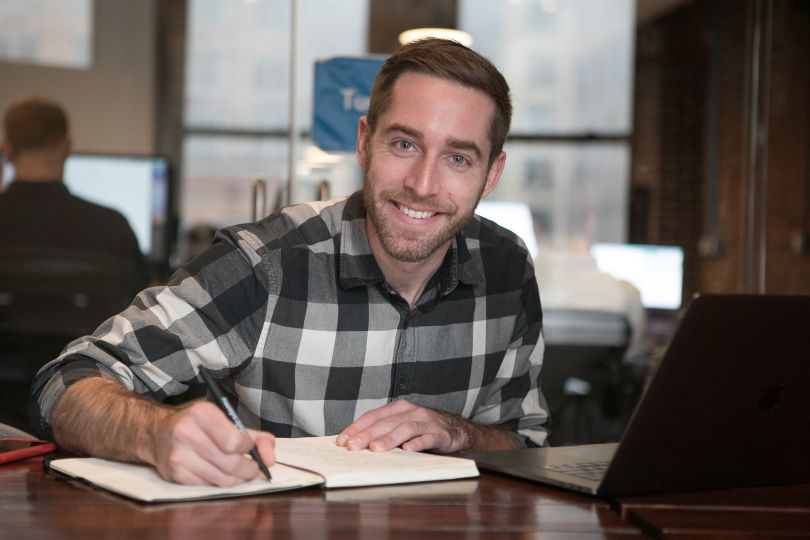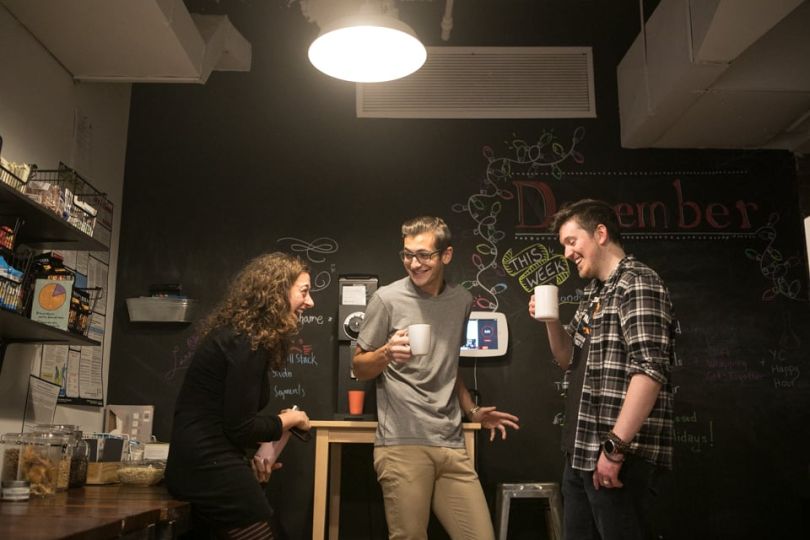
New York-based Codecademy, a learning platform for software engineers, looks for people who can “think like a founder,” said Oliver Plattner, vice president of engineering.
“This means they’re willing to take on multiple responsibilities and do things outside of their job description,” he said, recalling an incident in which an engineer jumped in to support a team member facing an emergency; it happened to be 2 in the morning.
“A willingness to help and always support each other is one of the strongest aspects of our culture,” said Plattner.
The job also requires workers to be self-starters who are eager to learn something new every day but self-aware enough to take others’ help when it’s needed. We recently asked the team to share more of their work.


YEAR FOUNDED: 2011.
WHAT THEY DO: Train people to code via online computer programming lessons.
WHERE THEY DO IT: In a loft space just north of the epicenter of Midtown South. The building is called the Radio Wave because inventor and scientist Nikola Tesla lived here.
IDEAL CANDIDATES: People who don’t just adhere to a list of job responsibilities but have the initiative to do what it takes.
TECH STACK: React/Redux on the front end; Ruby, GO and Python on the back end; MongoDB and Amazon S3 for storage; AWS services for hosting the infrastructure.
CLAIM TO FAME: New York Mayor Michael Bloomberg was a subscriber.


Laura Breiman, Curriculum Developer
Breiman writes lessons to give users the coding skills they need to find jobs. She loves working with her team members to create storylines that hook users into working through the lesson.
BEYOND WORK: She does improv comedy to stay inspired.
Describe what your team is responsible for doing.
Breiman: The curriculum team creates the lessons, projects, quizzes and articles that empower learners around the world to dive into new technologies. We are responsible for planning and structuring lessons and learning concepts, writing narratives to explain hard concepts, reviewing other team members’ content and constructing tests to assess learner input.
Describe an ideal candidate for this team.
Breiman: We value people who can give and receive feedback. During the interview, if it seems like someone would take feedback poorly, it’s an immediate red flag. Even if someone struggles with a technical concept, if they act with modesty and a true desire to learn and grow, we weigh that more than anything.
What are you proudest of from your team?
Breiman: The curriculum team pushed out three “intensives” in the past month: one on data analysis, one on test-driven development and one on user interface design. These three domains are hugely important in software engineering, and hugely relevant to our users. It was a wild, stressful push to get all of that content out there. I’m proud that our team was able to manage it — and stay friends throughout the process.
How do you create a team feeling?
Breiman: We all eat lunch together. We have an unspoken “don’t talk about work during lunch” policy, so we spend most of that time making bad jokes, asking deep questions or making good jokes. Also, our work is very collaborative. We sometimes author courses together. There’s nothing like being chained to the same deadline to create some good old team bonding.


Lydia Stepanek, Software Engineer
As part of the learner team, Stepanek designs features from end to end, identifying and implementing solutions for problems. She describes her work as a mix of strategy and coding.
BEYOND WORK: Painting. If you’re walking by her place, look up. You might see a painting on her fire escape, placed there to dry.
Your team grew a lot last year. What was that like?
Stepanek: We have 14 members of our team, nine of whom joined in 2017. I joined in January 2017 with two other engineers. We became friends quickly and it was funny to feel like an “old timer” one month later when more people joined. It felt natural to grow because we knew each other so well and made a big effort to make new members feel included.
What is onboarding like for new engineers?
Stepanek: Codecademy is a startup so, when I joined, the engineering onboarding was more of a learn-as-you-go process. But recently one of our senior ops engineers, Chris, saw an opportunity to improve our onboarding. He carefully designed a new process where we hold five to six onboarding sessions on the different aspects of our stack: event data, front end, our code evaluation service, our curriculum tools, payment system and infrastructure. This month, I taught an onboarding session on event data.
Reflect back on when you joined this company. Is there anything that surprised you?
Stepanek: I am able to have much more input on engineering standards and product decisions than I thought, which I love.
How does Codecademy's project-based philosophy prepare coders for today's workforce?
Stepanek: I think we are preparing our users for a job exactly like mine. Every day, I build a project using something unfamiliar — whether it be a whole new technology or just a new function. That’s exactly what users do on our site.
Every day, I build a project using something unfamiliar — whether it be a whole new technology or just a new function. That’s exactly what users do on our site.”
Describe an ideal candidate for your team.
Stepanek: An ideal candidate is low ego and hoping to grow quickly. Everyone on our team joined with a specific skill set and had to be willing to stretch themselves because our stack uses so many technologies, including ES6, React, Ruby, Rails, Go, Docker, Chef, Redis and more.


Oliver Plattner, Vice President, Engineering
Plattner sets the team’s mission and vision, acting as a strategist on the one hand — and a mentor and coach on the other. Partnering with product managers and designers, he prioritizes product roadmaps and thinks proactively about processes that will help his team thrive and scale.
BEYOND WORK: Plattner explores portrait and landscape photography.
What do you look for in candidates?
Plattner: We look for people who will think like a founder. This means they’re willing to take on multiple responsibilities and do things outside of their job description. For instance, an engineer might write product specs because there isn’t a PM hired to do that yet. Thinking like a founder means being strategic and optimizing around the resources available.
We look for people who will think like a founder. This means they’re willing to take on multiple responsibilities and do things outside of their job description.”
What’s your day like?
Plattner: Usually I spend my mornings preparing the day, either at home or at a coffee shop. I take time to catch up on emails, read through action items and plan for the meetings ahead. A typical day will consist of 10 to 14 meetings, most of which last about 30 minutes. I try to be in the office by 9 a.m. and will typically leave around 7 p.m.
What does Codecademy do to ensure engineers’ continued growth?
Plattner: Every engineer wears multiple hats and is working on various layers of the stack. We have a lot of different projects running in parallel so it allows people to take ownership of managing an end-to-end project.
Tell me about a moment in which your team solved a problem in a way that reflected the Codecademy culture.
Plattner: We recently had an outage in the middle of the night and the on-call engineer needed help from someone else. She reached out and one of the team members immediately jumped in and provided support, even though it was 2 a.m. A willingness to help and always support each other is one of the strongest aspects of our culture.
When you joined this company, were you surprised by anything?
Plattner: I was most surprised by how many great processes and systems the team had already put in place. For such a small company and new team, this was really amazing. Things like sprint processes, postmortems and on-call rotations were already working really well. Onboarding and pushing code to production was also extremely easy. Most companies don’t have these things figured out until they are much, much larger.

If a developer came to you and said they were burnt out, what would you say and do?
Plattner: The first thing I would say is: How can I help? I would listen to understand what it means to them to be burnt out. From there, I would work closely with the individual and HR to understand how we can best provide a work environment for that person that is balanced.
There’s nothing more important than an individual's well being. If we need to send them on a vacation, I would be glad to cover that and see them rejuvenated. I would also dig deep to understand how we let something like this happen to make sure we improve and hold ourselves accountable for providing a healthy environment.




